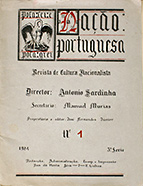

................................
It ran for six series from 1914 to 1931. From 1932 until 1938, it was published in volumes. The respective directors were Alberto de Monsaraz (1914 to 1916), António Sardinha (1922 to 1924), and Manuel Múrias (1926 to 1938). The main contributors over twenty years were Alberto de Monsaraz, António Sardinha, Adriano Xavier Cordeiro, Amadeu de Vasconcellos (" Mariotte "), Hipólito Raposo, José Adriano Pequito Rebelo, Luís d’Almeida Braga, Rolão Preto, Simeão Pinto de Mesquita, Afonso Lopes Vieira, João Amaral, Manuel Múrias, Alfredo Pimenta, Garcia Pulido, Caetano Beirão, Fernando Campos, J. Lúcio de Azevedo, Rodrigues Cavalheiro, João Ameal, Marcello Caetano, Martinho Nobre de Melo, Mussolini, Gonçalves Cerejeira, among other names .
In an attempt to publicise Nação Portuguesa in a first phase, there were two different parts: 1st—studies of momentary curiosity, made up of chronicles, transcriptions, and references to the magazine; and 2nd—essays on criticism, philosophy, history, and science, with the problems of the spirit being discussed and forming the original contribution to the mental resurgence in which the integralists were engaged.
The following are examples of historical studies published in the magazine: António Rodrigues Cavalheiro, "À margem dum processo " (A questão Gomes Freire) I, II e III" [On the sidelines of a process, The Gomes Freire matter, I, II and III] (no. 2, 1922; no. 5, 1922 and no. 5, 1925) and " Os Motins de Campo de Ourique em 1803" [The Riots in Campo de Ourique in 1803] (vol. VII, 1931-32); António Sardinha, "O Sul contra o Norte I e II" [ The South versus the North I and II] (no. 2, 1922 and no. 3, 1922), "O génio peninsular" [ The peninsular genius ] (no. 4, 1922) and "1640" (no. 6, 1922); Manuel Múrias, "A Batalha de S. Mamede (1128-1928)" [ The Battle of S. Mamede (1128-1928)] (no. 1, 1928) e "De Aljubarrota a Alcácer" [ From Aljubarrota to Alcácer] (no. 3, 1928). And the following critical studies of historical works stand out: "Portugal na Grande Guerra e o livro do major Vasco de Carvalho" [Portugal in the Great War and Major Vasco de Carvalho's book ] (João de Castro, no. 1, 1924); "Anotações à margem de um capítulo de Alberto Sampaio" [Notes on the margin of a chapter by Alberto Sampaio] (J. Lúcio de Azevedo, no. 3, 1925); "Um livro de João Ameal" [A book by João Ameal] (Manuel Múrias, vol. VII, 1933); "No Limiar da Idade – Nova" [On the Threshold of the New Age] (Fernando Campos, vol. IX, 1934); "O problema da sucessão do rei D. João VI na «História de Portugal" do sr. Fortunato de Almeida" [The matter of the succession of King João VI in the «History of Portugal» by Mr. Fortunato de Almeida] (Caetano Beirão, vol. VII, 1932) and " Estudos Filosóficos e Críticos . A remarkable book by Alfredo Pimenta" [Philosophical and Critical Studies. A remarkable book by Alfredo Pimenta] (João Ameal, series VI, 1931). There was a collaboration by several foreign authors, especially from Spanish-American origin: Angélica Palma, " Hispanismo y Nacionalismo " [ Hispanism and Nationalism] (no. 5, 1922); A. Herchen , "A Abrilada” [The Abrilada ] (no. 10, 1923); Marquês de Lozoya, " Ganivet y el Hispanismo " [ Ganivet and the Hispanism ] (series IV, 1926), "La guerra de las Naranjas " [The War of the Oranges] (no. 3, 1925), e " Notas sobre la obra de Antonio Sardinha" [Notes on the work of Antonio Sardinha] (no. 3, 1928); Juan Beneyto Pérez, "Portugal y Felipe II" [Portugal and Felipe II] (no. 6, 1926) e "Latinidad, Cristandad e Hispanismo " [Latinity, Christendom and Hispanism ] (no. 10, 1927); Mussolini, " Elogio da ditadura " [Praise for the dictatorship] (vol. VII, 1933).
This work is financed by national funds through FCT - Foundation for Science and Technology, I.P, in the scope of the projects UIDB/04311/2020 and UIDP/04311/2020.
